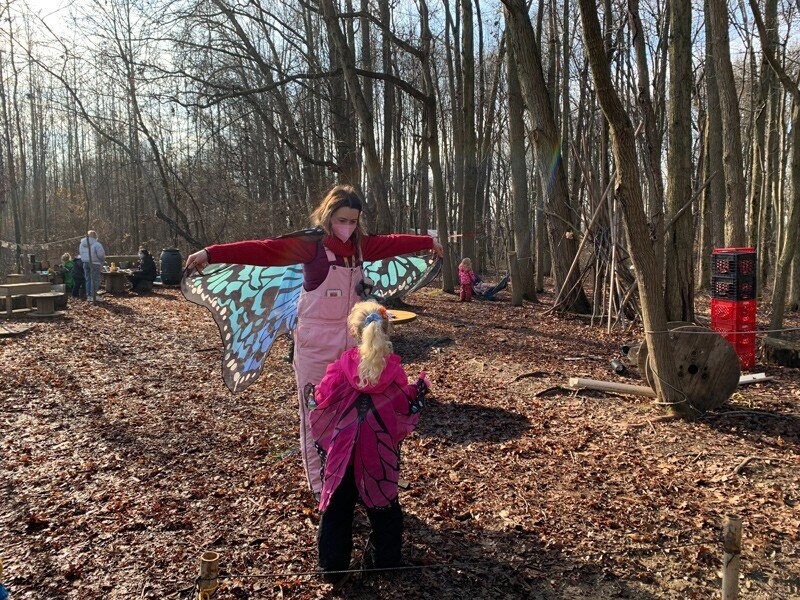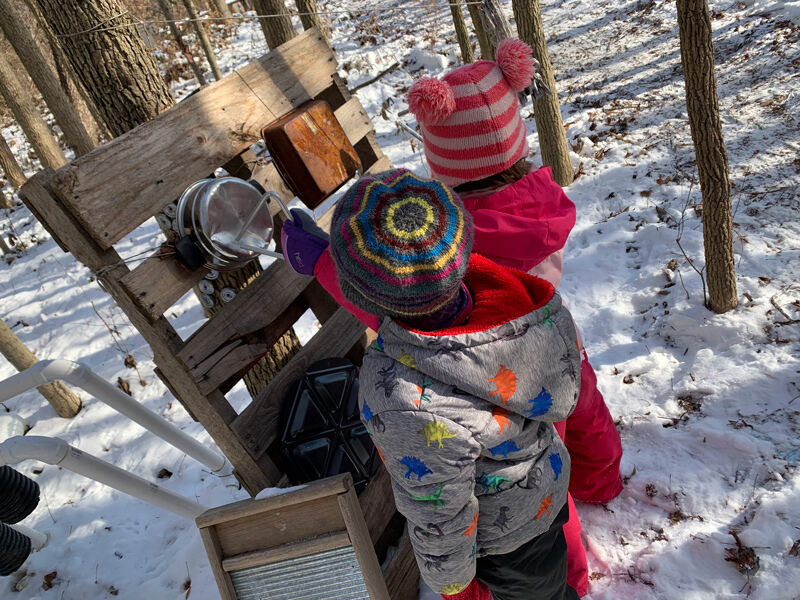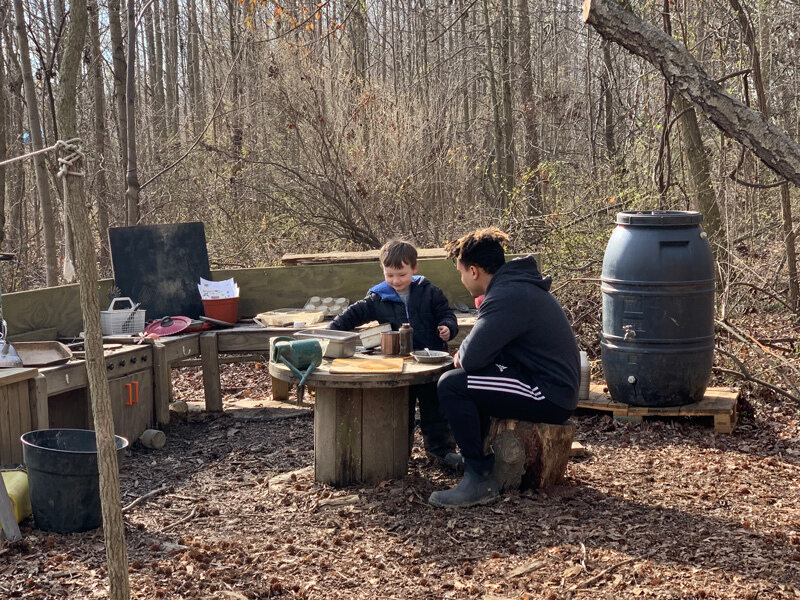Human Development and Family Sciences
Learning in Nature

“Dressing for the weather” takes on a literal meaning for parents who drop off their preschoolers at the University of Delaware’s Lab School, located on the College of Education and Human Development’s (CEHD) Children’s Campus. Taking their cue from the weather, the children arrive in rain boots, hats and jackets, ready to spend most of their day playing and learning in the nature trails, stream or edible forest adjacent to the Lab School building.
Established in 1934, the Lab School educates children from the age of six months to kindergarten while serving as a rich laboratory for UD students studying early childhood education and researchers interested in child development. With a commitment to child-driven learning and a compassionate mentoring program for preservice childhood educators, the Lab School has modeled high-quality childhood education for nearly 88 years.
In 2017, the Lab School began its nature-based preschool program, pioneered by master teacher Katie Pollock. It has since become a leader in the field, garnering the attention of the prestigious In Bloom Conference, a professional learning event for educators interested in nature-based education. On Saturday, April 2, the Lab School will host the conference, and several UD teachers and faculty members will lead the afternoon events.
“A high-quality early childhood curriculum focuses on the child and the development of the child, including their physical development, their language development, their sense of themselves, their ability to interact with others and their ability to learn literacy, math, science and social studies. When you teach a high-quality early childhood program, you’re addressing the whole child, and that is something that the Lab School has always modeled,” said Jennifer Gallo-Fox, associate professor in CEHD’s Department of Human Development and Family Sciences (HDFS). “We strongly connect the theory and the research of the field and exemplify it at the Lab School. The nature-based curriculum is another way of showing what this model can look like when you’re outside.”
Nature-based education
The Lab School’s nature-based program engages preschoolers’ sense of wonder and curiosity through a balance of child-driven and teacher-directed outdoor activities that foster social, physical, cognitive and language development. Children explore the trails, creeks and wooded areas around the Lab School while engaging in activities that integrate science, math, literacy and the arts.
“At the heart of nature-based education is the belief, supported by research, that young children benefit from opportunities to spend time in nature supported by caring adults,” said Ellen Doris, director of the nature-based early childhood certificate program at Antioch University and one of the keynote speakers for the In Bloom Conference. “We want outdoor play and learning to be part of every childhood so that every child can develop sturdy, loving connections to nature and to their communities.”

Even during the colder months, children at the Lab School spend most of their time outside, exploring the terrain as it changes during the winter. They may investigate ice or snow under a microscope, study a tree without its leaves or learn about hibernating animals.
“Some schools will do a unit on winter, but winter isn’t two weeks long,” Pollock said. “Winter is very long, and there are different stages of winter. We can discover different things about ice, like how it melts or how it refreezes, and encourage the children to investigate it with magnifying glasses and microscopes. We can ask them to think about temperature and how shade affects different parts of the ice. But most of all, we get them to wonder, we get them to question, and we get them to love learning.”
At the center of this emergent curriculum — driven by the child’s own curiosities and development — is a strong sense of community. The teachers and staff at the Lab School begin building relationships with the children and their families before the beginning of the school year so that every child feels cared for and supported in their academic and social-emotional growth. The Lab School also invites members of the community, such as master gardeners and children’s book authors, to share their expertise and engage with the children in playful learning activities.
Rich mentoring for preservice teachers
The Lab School is also unique in its commitment to the mentoring of preservice childhood educators, especially the UD students enrolled in the early childhood education (ECE) program, housed within HDFS.

As early as their sophomore year, ECE students spend one day a week at the Lab School, co-teaching with the master teachers, developing relationships with the children and cultivating reflective practice, a model for studying one’s own teaching and improving upon it based on experience and continued learning.
“Before the children arrive, we talk with the ECE sophomores about the activities that are out, the intentionality that went into the activities, the skills that we’re encouraging as a result, and we ask how they could extend or scaffold the play,” Pollock said. “Once the children arrive, the students are on the floor. We don’t want them sitting back and taking notes — there is a different time and place for that. We want them engaged. When they are here, they are a part of our teaching team. We build relationships with them from the get-go, and we have a reciprocal relationship regarding our goals.”
Some of these students then complete their student teaching at the Lab School, developing a long-lasting professional relationship with the teachers and staff long after they graduate from UD.
During the COVID-19 pandemic, the Lab School remained one of the only sites in Delaware open to student teaching. ECE students and other preservice teachers were able to witness firsthand how the teachers and staff pivoted to online instruction and then quickly reopened for in-person instruction after expanding and enriching their current outdoor spaces.
Hosting the In Bloom Conference
Highlighted by external organizations, such as the Natural Start Alliance, the Lab School master teachers — a title that denotes a high level of expertise and a commitment to scholarly, reflective practice — and its dedicated staff have established themselves as leaders in early childhood education.
The Lab School will host the In Bloom Conference, organized by David Sobel of Antioch University, where several of the master teachers are either completing or have graduated from their certification program in nature-based education.
“It’s wonderful to have a whole group of teachers pursuing their professional development together in a collegial way,” Doris said. “These teachers are all so inspiring in terms of what they’ve already accomplished at the Lab School. They’re not learning for the first time about nature-based education at Antioch — they have already moved that forward in a wonderful way in their own program and are helping other professionals learn. They have been really generous about contributing their expertise to colleagues in the program, and they are so eager to learn more.”
The Lab School teachers and HDFS faculty will lead several of the afternoon workshops, focused on topics such as child-driven exploration, nature-based science practices and engineering processes, studying birds with toddlers and cultivating mindfulness.
To register for the In Bloom Conference, hosted in conjunction with Antioch University and HDFS, visit Antioch University’s registration page. To learn more about the Lab School and its programs, visit its website.
Article by Jessica Henderson
